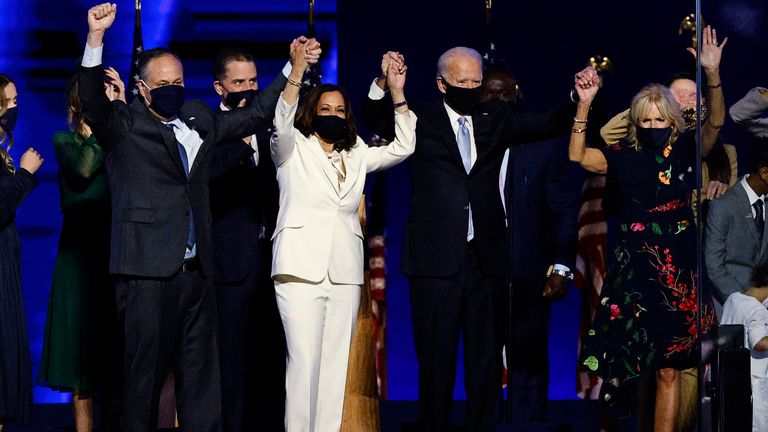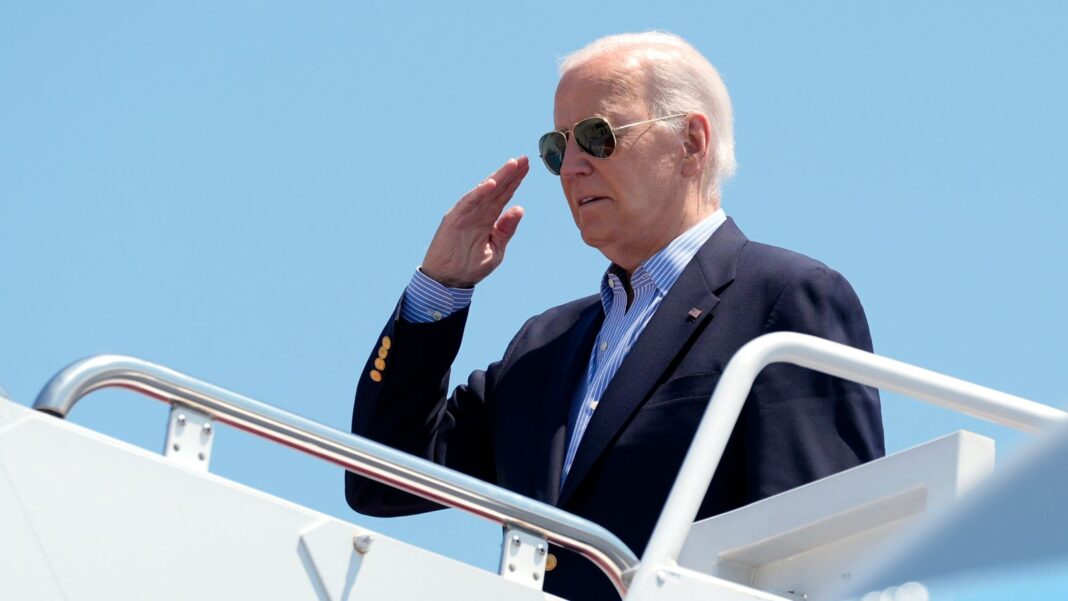Joseph Robinette Biden Jr is one of America’s longest-serving politicians.
His election as the 46th president of the United States was the pinnacle of a political career that spanned more than 50 years, intertwined with a personal life marked by tragedy.
He was sworn in as a senator for Delaware in January 1973 in a medical centre chapel. A car crash had claimed the lives of his first wife and daughter and he was caring for his two sons, who had been injured in the collision.
Throughout his subsequent career in Congress, the “family first” senator would commute daily between his Delaware home and Washington DC.
Biden was a political player on Capitol Hill, polished on camera, influential in the corridors and committees. Notable legislative successes included anti-crime laws and increased powers to tackle violence against women.
Joe Biden as a newly elected Democratic senator in 1972. Pic: AP
Biden first ran for the Democratic presidential nomination ahead of the 1988 election, but a stuttering campaign ground to a halt after he was accused of plagiarising a speech by the former UK Labour leader, Neil Kinnock.
Kinnock had said: “Why am I the first Kinnock in a thousand generations to be able to get to university?” and “Was it because all our predecessors were thick?”
Biden said: “Why is it that Joe Biden is the first in his family ever to go to a university?” and “Is it because our fathers and mothers were not bright?”
He declared his candidacy a second time before the 2008 election. An able performer on the stump, he famously denigrated Rudy Giuliani, the then Republican frontrunner, with the line: “There’s only three things he mentions in a sentence – a noun and a verb and 9/11.”
Equally, he was prone to gaffes. In remarks that skewered his own campaign, he said of Barack Obama: “You got the first mainstream African-American who is articulate and bright and clean and a nice-looking guy… I mean, that’s a storybook.”

Barack Obama and Joe Biden at the White House the day after the 2016 election. Pic: AP
After he withdrew from the race, Biden was selected by Obama as his running mate and he was duly sworn in as vice president in 2009.
Obama leaned on Biden as a political operator, at home and abroad. His foreign policy experience was deployed to Iraq, in particular, before US troops pulled out in 2011.
Biden considered running for the presidency in 2016 but his life had again been affected by personal tragedy in 2015, when his eldest son Beau died.

Joe Biden’s son Beau died in 2015. Pic: AP
He decided not to stand, having questioned whether he had the “emotional energy” for it and stating that: “Nobody has a right, in my view, to seek that office unless they’re willing to give it 110% of who they are.”
In 2020, he decided to run for the White House following riots in Charlottesville, Virginia, in 2017. Violence had broken out between white supremacists and counter-protesters and the then president Donald Trump stated that there were “very fine people on both sides”.
Biden, offended by the moral equivalence, declared he was running for the presidency in 2020 out of a sense of duty. He styled himself as the elder statesman restoring order and stability to government.
Please use Chrome browser for a more accessible video player

1:36
Who could replace Biden and how?
His campaign survived a brush with scandal when several women accused him of inappropriate physical contact, such as embracing or kissing. Subsequently, he said he would be more respectful of people’s personal space.
With Kamala Harris as his running mate, Biden won the election and was sworn in as president in a scaled-down inauguration because of COVID. At the age of 78, he was the oldest person ever to assume the office.

Joe Biden and Kamala Harris on stage with their partners after winning the 2020 election. Pic: Reuters
Biden signed America back up to the Paris Climate Agreement and the World Health Organisation as he sought to reverse the American isolationism of the Trump years.
He had entered office during the recovery from a pandemic recession.
Amidst a surge in inflation, his approval ratings plummeted. Before the 2022 midterm elections, there were expectations of a “red wave” of Republican success.
Biden called it a “battle for the soul of the nation” and, in the event, a red wave never materialised. A key factor was the backlash to tighter restrictions on abortion, following the Supreme Court’s Roe v Wade decision.
Foreign affairs demanded much of Biden’s focus.
This content is provided by Spreaker, which may be using cookies and other technologies.
To show you this content, we need your permission to use cookies.
You can use the buttons below to amend your preferences to enable Spreaker cookies or to allow those cookies just once.
You can change your settings at any time via the Privacy Options.
Unfortunately we have been unable to verify if you have consented to Spreaker cookies.
To view this content you can use the button below to allow Spreaker cookies for this session only.
👉 Click to subscribe to the Sky News Daily wherever you get your podcasts 👈
His early months in office were blighted by a chaotic departure of US troops from Afghanistan. Trump had ordered the withdrawal but after the Taliban had seized control, Biden presided over a hasty evacuation in which 13 US soldiers were killed.
He was a staunch defender of Ukraine in its war with Russia and fought political opposition at home to continue US support for their war effort.
His efforts to bring about a resolution to the Israel-Hamas conflict challenged his authority and influence. It impacted his standing at home, with violent protests on college campuses, and an “Abandon Biden” campaign that urged voters to withhold their support at the ballot box.
Read more:
Biden’s various gaffes over the years
Zelenskyy reacts to Biden’s ‘President Putin’ comment
Under Biden, the UK-US special relationship didn’t seem as special as it used to be. He frustrated post-Brexit British governments by refusing a wide-ranging trade deal.
The president with Irish roots didn’t attend the coronation of King Charles, raising suggestions of a snub, and he caused upset with remarks about a visit to Northern Ireland, which he said he’d undertaken to make sure the “Brits don’t screw around” with the commitments of the Good Friday Agreement.
Joe Biden’s public gaffes have been a feature of his time in office, laughed off until concerns rose that they reflected a frailty unsuited to the job. The list is endless.
There was the time he praised former Democrat speaker of the House Nancy Pelosi, whom he said “helped rescue the economy in the Great Depression”.
Please use Chrome browser for a more accessible video player

1:53
‘I’m only three years older than Trump’
He intended to say the great recession of 2008, rather than the economic crisis in the early part of the 20th century.
In 2020, President Biden appeared to give up on a quote from the Declaration of Independence.
He said during a speech: “We hold these truths to be self-evident, that all men and women were created by the go-, uh, you know the, you know the thing!”
In 2023, he confused the name of the New Zealand All-Blacks rugby team with the reviled British paramilitary force the Black and Tans during a visit to Ireland.

Keep up with all the latest news from the UK and around the world by following Sky News
It was all good fun until it wasn’t. Having initiated a TV debate with Donald Trump to rally support ahead of the November election, he turned in a dreadful performance.
He froze on stage and struggled to string sentences together, at points trailing off into silence.
He claimed he had a “bad night” but it prompted deep concerns in the Democratic movement that he was a liability who would lose them the election.
Ultimately, it signalled the end of his political career.







